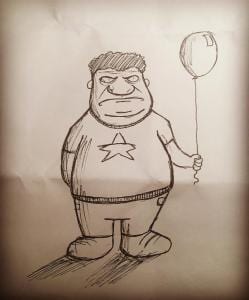My child says it’s easier to draw a man’s face than a woman’s. [Used by Permission]
This is sort of interesting, in a desultory kind of way. It’s a bunch of writers I’ve never heard of pondering what happened to art and music under the Era of Trump. No one really said anything definitive, other than that it was a great great time for memes. And TikTok. That went really well. Other kinds of art not so much, and comedy, even though it should have come into its own, definitely did die under the crushing weight of rage and disappointment. That, I think, is an unassailable truth. Nothing is funny anymore.
In some circuitous way, I think I have discovered why by reading the chapter on Horace Mann in Christopher Lasch’s The Revolt of the Elites. Apparently, Mann was not a fan not only of “imagination,” that’s Lasch’s word, but most especially war and militarism. He writes this:
We get a little insight into Mann’s limitations by considering his powerful aversion to war–superficially one of the more attractive elements of his outlook. Deeply committed to the proposition that a renunciation of war and warlike habits provided an infallible index of social progress, of the victory of civilization over barbarism, Mann complained that school and town libraries were full of history books glorifying war.
He briefly compares Mann’s aesthetic to Adam Smith’s:
It was a matter of regret, in Smith’s view, that the “general security and happiness which prevail in ages of civility and politeness” gave so “little exercise to the contempt of danger, to patience in during labor, hunger, and pain.” Given the growth of commerce, things could not be otherwise, according to Smith, but the disappearance of qualities so essential to manhood and therefore citizenship was nevertheless a disturbing development. Politics and war, not commerce, served as the “great school of self-command.”
Whereas, as Lasch goes on to show:
Mann’s opinion of politics was no higher than his opinion of war. His educational program did not attempt to supply the courage, patience, and fortitude formerly supplied by “war and faction.” It therefore did not occur to him that historical narratives, with their stirring accounts of exploits carried out in the line of military or political duty, might fire the imagination of the young and help to frame their own aspirations. Perpahs it would be more accurate to say that he distrusted any sort of appeal to the imagination. His educational philosophy was hostile to imagination as such. He preferred fact to fiction, science to mythology. He complained that young people were given a “mass of fictions,” when they needed “true stories” and “real examples of real men.” But his conception of the truths that could safely be entrusted to children turned out to be very limited indeed. History, he thought, “should be rewritten” so as to enable children to compare “the right with the wrong” and to give them “some option of admiring and emulating the former.” Mann’s objections to the kind of history children were conventionally exposed to was not only that it acclaimed military exploits but that right and wrong were confusingly mixed up together–as they are always mixed up, of course, in the real world. It was just this element of moral ambiguity that Mann wanted to eliminate. “As much of History now stands, the examples of right and wrong…are…brought and shuffled together.” Educators had a duty to sort them out and make it unambiguously clear to children which was which.
I take the trouble to put that all down because I did just finish listening to Jesus and John Wayne yesterday, and du Mez, as I’m sure you know, takes great pains, in her effort to make sure everyone knows who is right and who is wrong, to mash “militarism” together with “Evangelicalism” and “patriarchy” and “being white and being male” and liking John Wayne. If you are looking for a sort of history that Horace Mann would have loved, she is your historian. All nuance, all the jumbled mess of real people’s motivations and lives are swept up into a heap and thrown into the dustbin of her historical worldview.
So anyway, the problem is that for humor you need to be caught off guard. Your expectation of what should happen has to be unmet. Predictability is the murderer of comedy. Knowing who is right and who is wrong is the most boring and stupid thing in the entire world. If the humorist, or artist, could have manufactured even a hint of sympathy or affection for Mr. Trump, she might have been able to more truly subvert that which she believed to be most evil.
Lasch points out that Horace Mann grew up in a puritan household. Though he did not embrace any of the religious propositions or beliefs of his parents, he took their aesthetic approach to life with him as he remade American schools. And so you can see what we have. It is a wreck of a mess. TikTok and the meme reign supreme, Mr. Trump destroyed America, and all because of “Evangelicals.”
Well, I’m going to wait a while before I accept any “historical” account of the last five years. The true story is much more fascinating. The villains and heroes are all still creeping around in the shadows, waiting to be cast forth upon the page.













